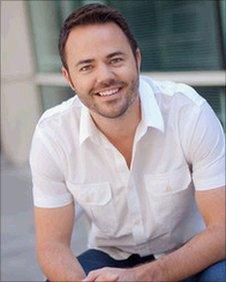A child's journey from Club Penguin to Facebook
- Published
Staying safe online can be complicated enough for adults - hands up those who have clicked on a spam link or inadvertently downloaded a virus to their PC? - so imagine what a minefield it can be for a child.
My eight-year-old son recently got his first email address and while Microsoft claims to have radically cut Hotmail spam I am still monitoring his inbox daily for inappropriate mails, mindful that he will pretty much click on anything in his excitement at having received a message.

Facebook is everywhere but at what age should children be allowed to join?
He is also keen to join Facebook, causing minor panic earlier this month by claiming he had set up a fake account.
He hadn't but plenty of children do. Ofcom estimates that 30% of eight to 11-year-olds have Facebook profiles, despite the joining age of 13.
As part of theBBC's School Report project, external, newly joined Facebookers from Harris City Academy in south London quizzed the social network's director of policy Richard Allan on how it keeps children safe and a range of other issues.
They asked him what Facebook was doing to keep out under-age users.
"There is a place where they can be reported. Those reports come to our staff and if it looks like they are nine or 10 they can just close the account," he said.
But with so many young children keen to join, will Facebook consider dropping its current age limit?
It is, said Mr Allan, a conversation that needs to be had. But he quashed rumours that Facebook is working on a junior version of the site.
"That has not been our focus. We've built this service and it is actually difficult to make it available to 800 million people. We are really focused on building that," he said.
Penguin power
Children too young for Facebook now have plenty of options, although most are aimed at the under-10s.
Club Penguin is one of the most successful. The social network, which has attracted over 150 million children since it launched in October 2005, offers children the chance to become a penguin, "waddle around" and decorate an igloo.
Lane Merrifeld set it up because he felt that the internet at that time offered little chance for his own children to be social and safe.
"The net was divided into two segments, areas that were singular isolated experiences and the rest. Children wanted to be sociable so they were going on to AOL chatrooms or on World of Warcraft but they were not at all safe," he said.
Club Penguin takes the idea of safety and turns it on its head. Adults are not banned and, in theory, a paedophile could enter the site but their actions would be muted by filters limiting what can be discussed.

Lane Merrifield founded Club Penguin to create a safe place for young children
"Words such as address, school and phone number are not allowed. It is a truly anonymised environment. There is simply no opportunity for personally identifiable information," said Mr Merrifield.
Over 200 moderators look out for inappropriate language and identify "pester" penguins who may not be saying anything particularly rude but are simply following others around.
Of course even very young children want to venture out from the safe confines of the Club Penguins of this world and they can be easy prey online as cybercriminals increasingly target sites aimed at children.
Graham Cluley, a senior consultant for security firm Sophos, thinks that children should sit an internet proficiency test in the same way as many do currently before riding a bike on the road.
"We need the same kind of thing to teach children how to be safe online," he said.
Malicious gossip
Often it is not the nameless cybercriminals who pose the real dangers to children online. Sometimes the threat can be much closer to home.
Increasing numbers of children are becoming victims of cyberbullying, whether it be via text, email or social networks and that can be far more upsetting than downloading spam.
Ted Nash knows all about the topic. The 20-year old digital entrepreneur made his name as the founder of controversial social website Little Gossip.
The site, which allowed users to nominate a person that others could gossip about, was shut down in December 2010 following outrage from groups such as Mumsnet, furious at the blatant cyberbullying.
With hindsight Mr Nash admits the site was a mistake.
"I started the site with good intentions and it quickly exploded. I had 66,000 pieces of gossip in the first couple of days and it was impossible to police," he said.
The site has since been reopened by Russia-based owners.
But Mr Nash is still concerned by what he says is the wider problem of ISPs not taking as much responsibility as they could for cyberbullying.
He thinks they should target individual perpetrators in much the same way as schools confront offline bullies.
'Olden days'
Whatever the dangers lurking on the net, children are going to carry on living their lives online.
A recent survey conducted by consumer research firm Intersperience suggested that 60% of children aged between 12 and 16 would be "sad" without a web connection, while 48% said they would be lonely.
BBC School Reporters at Chislehurst and Sidcup Grammar School agreed that they could not imagine life without the internet.

The School Reporters at Chislehurst and Sidup Grammar school are clued up about net safety
"We've had it all our lives and we have just become so used to having iPods, iPads, laptops at our fingertips. It seems strange that in the olden days people had to go to libraries to find out information," said Isabella, a Year 8 pupil at the school.
As part of European Safer Internet Day theyhave written their own guide to staying safe online., externalThey have the basics off pat: do not give out personal information online, make sure your PC has anti-virus software, make sure your passwords cannot be easily guessed.
Savvy kids
"We've learnt through a mixture between parents telling us and common sense," said fellow pupil Josie.
Seasoned gamer Jared knows all the tricks of the trade but has been caught out when downloading gaming modifications from the net.
"You have to be careful with the things you download from the internet and put in your game. You need to know exactly what you are doing," he said.
Their awareness illustrates that children are often more savvy about the dangers of being online than they are given credit for.
A poll conducted for Safer Internet Day by BBC Radio 1's Newsbeat found that only 6% of 13-19-year-olds were likely to accept a friends request from someone they did not know, while 69% said that they understood how to change their Facebook privacy settings.
Often it is parents that really need educating.
"The parents are a lot more savvy now than when we set up Club Penguin because they have become users," said Mr Merrifield.
As they become more confident about using technology, walking their children through the dangers of the online world should be as second nature as the other milestones parents prepare them for, he thinks.
"We teach our children to look both ways before they cross the road and to avoid strangers so we should also teach them how to set up privacy controls on Facebook," he said.
- Published8 March 2012